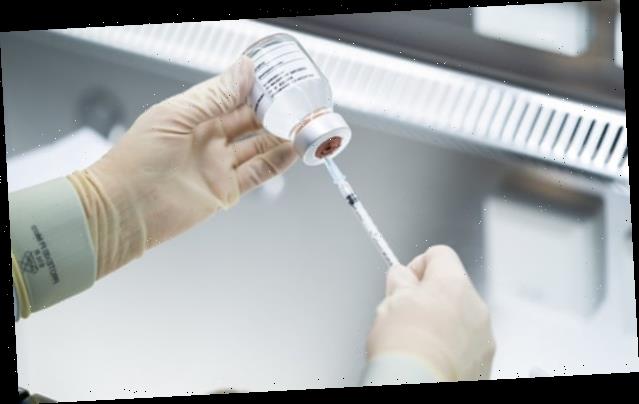Puberty blockers given to children wanting to change gender at controversial NHS clinic ‘impair height growth and bone density’, data reveals
- Tavistock and Portman Trust run only NHS specialist gender clinic for children
- Its study tracked 44 children wanting to change genders between 2011 and 2014
- Found no psychological issues but height and bone density growth was inhibited
- High Court ruled in December the clinic can no longer give puberty blockers to under-16s
Puberty blocker drugs do have long-lasting physical side-effects, a small study from a controversial gender clinic run by the NHS has found as it finally publishes its data.
The drugs, known as gonadotropin releasing hormone analogues (GnRHa), are given to children suffering with gender dysphoria and who wish to switch from their biological sex to a gender of their choosing.
Researchers from the Tavistock and Portman Trust in London run the only NHS specialist gender clinic for children in the UK and investigated these drugs.
Their study enrolled 44 children between 2011 and 2014 and found puberty blockers — which only stave off puberty and do not initiate a changing of genders — lead to ‘reduced growth’ for both height and bone density.
The authors say they expect the growth of both height and bone density to resume either naturally or via cross-sex hormones administered from 16.
Scroll down for video
The Tavistock and Portman NHS Trust (file picture) runs the UK’s first gender clinic in London. Data reveals puberty blockers administered by the clinic can cause stunted height growth and inhibited bone density growth
What is gender dysphoria?
Gender dysphoria is a condition in which someone becomes distressed because they don’t feel that their biological sex matches the gender they identify as.
For example, someone may feel like a woman and want to live as a woman, but have been born with the anatomy of a man.
Gender dysphoria is a ‘recognised medical condition, for which treatment is sometimes appropriate’ and is ‘not a mental illness’, according to the NHS.
People who live as a gender which is not the same as their biological sex are called transgender.
Some people may choose to have hormone therapy – for example, to make them grow hair or develop breasts – or to have reassignment surgery to give them the genitals of a person of the sex they identify as.
People diagnosed with gender dysphoria are allowed to legally change their gender.
According to the charity Stonewall, as many as 1 per cent of the population may be trans – although accurate numbers are not known.
The scientific paper has this week been published by the peer-review journal PLOS ONE.
All 44 patients were assessed and given psychological support, researchers said.
The group also underwent physical evaluation and treatment at University College London Hospitals NHS Foundation Trust (UCLH).
Researchers said most people taking part in the study reported no psychological issues and were happier and had better relationships with family and peers once their puberty-blocking treatment had started.
Some reported negative changes which were largely related to anticipated side effects such as headaches, flushes and fatigue, all of which were mainly mild, the researchers added.
They said the young people involved had been assessed for two years on average ahead of the study and had been experiencing gender dysphoria for at least five years.
The children were also deemed highly likely to suffer ‘severe psychological distress’ if they were to progress naturally to the point of full pubertal development.
The study was small and did not have a control group, which makes drawing definitive conclusions from the findings difficult.
Those behind the study acknowledged these flaws and said bigger, longer-term studies are required.
Dr Polly Carmichael, director of the GIDS, said the paper ‘adds to our understanding of the best way to support these young people’.
‘The results show patient experience on the blocker is positive overall and there were no unexpected adverse events.’
Professor Russell Viner, professor of adolescent health at UCL, said they had ‘followed rigorous ethical guidelines’ at all stages and had put their ‘carefully anonymised data from the study in the public domain to allow other researchers to replicate our main findings’.
An NHS trust which faced court for giving children puberty-blocking drugs has been rated inadequate by the UK’s health regulator, after inspectors found vulnerable young people ‘were waiting too long for treatment’.
The Tavistock and Portman NHS Trust was told by the Care Quality Commission it needed to significantly improve its services and waiting times, after it found more than 4,600 young people on the waiting list – with some waiting more than two years for their first appointment.
In response to the CQC report, the trust apologised to patients for the long waiting times and announced that it is bringing in experts from outside the service to help with improvements.
It comes after the trust – which runs the UK’s only gender identity development service for children – paused new referrals for treatment following a landmark High Court ruling in December over the use of puberty blockers.
The CQC said it carried out the inspections in October at the GIDS clinics at the Tavistock Centre in London and in Leeds following concerns by healthcare professionals and the Children’s Commissioner for England over ‘clinical practice, safeguarding procedures and assessments of capacity to consent to treatment’
The Tavistock clinic became entangled in a High Court legal battle last year after Keira Bell, 23, took legal action against the trust, arguing children cannot give informed consent to the treatment which could lead to permanent fertility issues.
Ms Bell, who began taking puberty blockers when she was 16 before ‘detransitioning’, brought the legal challenge with Mrs A, the anonymous mother of a 15-year-old autistic girl who was on the waiting list for treatment.
The case forced the trust to pause new referrals for hormone treatment.
Dame Victoria Sharp, sitting with Lord Justice Lewis and Mrs Justice Lieven, ruled in favour of Ms Bell and said under-16s need to understand ‘the immediate and long-term consequences of the treatment’.
Tavistock argued that the two stages of treatment — puberty blockers and cross-sex hormones — are distinct, with one not necessitating the other.
The court ruled against this, saying the two phases of treatment formed ‘one clinical pathway’.
This is supported by the fact of the 44 children recruited when they were between 12 and 15 years old, only one individual decided to not progress to the next stage of the transitioning process, which involves taking cross-sex hormones — a 97 per cent conversion rate.
Three of the participants had also taken breaks in treatment before they were 16 for various reasons, which the authors admit demonstrates patients can and do decide to interrupt treatment.
The High Court requested to see the full data of the study to help inform its decision in December, but Tavistock refused, stating it would be published in a peer-reviewed journal in the future.
But one day after the High Court gave its landmark ruling, Tavistock reneged and published its findings online as a pre-print, and not in a peer-reviewed journal.
The GIDS management team has since been ‘disbanded’, documents seen by Mail on Sunday reveal.
It comes weeks after the clinic was judged ‘inadequate’ by the Care Quality Commission.
Watchdogs said staff were afraid to raise concerns about patient safety for fear of ‘retribution’ from bosses.
A report said: ‘Staff did not always manage risk well. Many of the young [patients] were vulnerable and at risk of self-harm.
‘The size of the waiting list meant staff were unable to proactively manage the risks to patients waiting for a first appointment.’
Landmark ruling paves the way for review of child gender reassignment laws
At present in Britain under a 1985 court ruling, children under the age of 16 can consent to medical treatment if they are deemed to understand and fully appreciate the implications, in what is known at the Gillick competence test.
But opponents of puberty blockers said they wanted to make sure adolescents understood the drugs’ long-term consequences.
Judges have now ruled that puberty blockers and cross-sex hormones were, ‘two stages of one clinical pathway’.
They said once on that pathway, ‘it is extremely rare for a child to get off it’.
The High Court has now ruled that children must understand ‘the immediate and long-term consequences of the treatment’ to be able to consent to the use of puberty blockers.
This means doctors may now seek approval or support from the court before prescribing puberty blocking drugs to children, to try and avoid liability.
Following today’s ruling, NHS England has updated the specifications for gender reassignment. No one under the age of 16 can now be referred onto the puberty blocker pathway unless a court rules that it is in a child’s best interests.
There was a 30-fold rise in child referrals to the clinic in the past decade, up to 2,560 last year.
Source: Read Full Article



